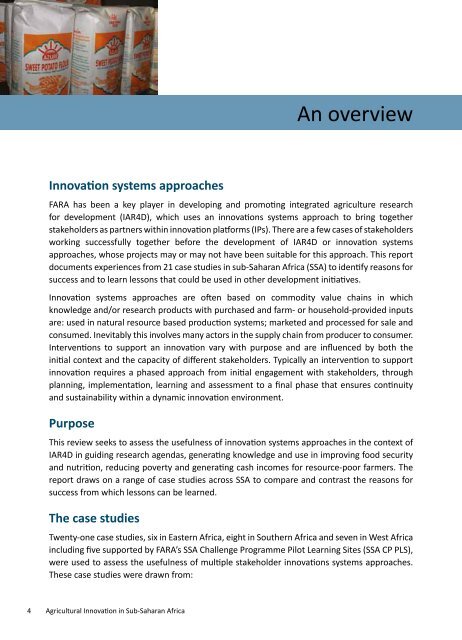1C1KKTs
1C1KKTs
1C1KKTs
Create successful ePaper yourself
Turn your PDF publications into a flip-book with our unique Google optimized e-Paper software.
An overview<br />
Innovation systems approaches<br />
FARA has been a key player in developing and promoting integrated agriculture research<br />
for development (IAR4D), which uses an innovations systems approach to bring together<br />
stakeholders as partners within innovation platforms (IPs). There are a few cases of stakeholders<br />
working successfully together before the development of IAR4D or innovation systems<br />
approaches, whose projects may or may not have been suitable for this approach. This report<br />
documents experiences from 21 case studies in sub-Saharan Africa (SSA) to identify reasons for<br />
success and to learn lessons that could be used in other development initiatives.<br />
Innovation systems approaches are often based on commodity value chains in which<br />
knowledge and/or research products with purchased and farm- or household-provided inputs<br />
are: used in natural resource based production systems; marketed and processed for sale and<br />
consumed. Inevitably this involves many actors in the supply chain from producer to consumer.<br />
Interventions to support an innovation vary with purpose and are influenced by both the<br />
initial context and the capacity of different stakeholders. Typically an intervention to support<br />
innovation requires a phased approach from initial engagement with stakeholders, through<br />
planning, implementation, learning and assessment to a final phase that ensures continuity<br />
and sustainability within a dynamic innovation environment.<br />
Purpose<br />
This review seeks to assess the usefulness of innovation systems approaches in the context of<br />
IAR4D in guiding research agendas, generating knowledge and use in improving food security<br />
and nutrition, reducing poverty and generating cash incomes for resource-poor farmers. The<br />
report draws on a range of case studies across SSA to compare and contrast the reasons for<br />
success from which lessons can be learned.<br />
The case studies<br />
Twenty-one case studies, six in Eastern Africa, eight in Southern Africa and seven in West Africa<br />
including five supported by FARA’s SSA Challenge Programme Pilot Learning Sites (SSA CP PLS),<br />
were used to assess the usefulness of multiple stakeholder innovations systems approaches.<br />
These case studies were drawn from:<br />
4 Agricultural Innovation in Sub-Saharan Africa


